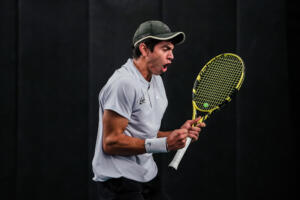Beginnings and Endings
by Graham HaysSEC Scholar Athlete of the Year Joubert Klopper’s final season is an opportunity to shape the future of Vanderbilt men’s tennis
NASHVILLE, Tenn. — No fanfare sounded when Joubert Klopper completed the final exam of his undergraduate years at Vanderbilt. No raucous celebration ensued, and that was for the best: The noise would have awakened the rest of the house, his family slumbering through the South African night.
Klopper arrived at Vanderbilt in January 2020. By the end of the spring semester nearly three and a half years later, the economics major and SEC Men’s Tennis Scholar-Athlete of the Year needed only one more elective to complete his undergraduate studies ahead of schedule. Home in Bloemfontein, South Africa, after the tennis season, he completed the final course online during Maymester. Given the time difference, it was after midnight local time when he typed the final punctuation on the final exam of a journey spanning years and continents.
“I was pretty happy about it, but the whole family was sleeping—I was just there with my dogs,” Klopper recalled. “So I went and made myself a cup of tea and went to bed. It was somewhat anti-climactic.”
 A reluctance to disturb anyone’s sleep wasn’t the only reason for muted celebration. Earning his degree marked the end of one journey, but Klopper already had a ticket booked to return to Nashville. Four seasons, 90 victories, two significant injuries and one degree after he arrived, he still had unfinished business. Literally. He is now enrolled in Vanderbilt’s 10-month Master of Science in Finance program, having completed a summer internship with a Nashville investment bank. And thanks to the additional eligibility afforded NCAA student-athletes affected by the COVID-19 pandemic, he is playing one more season for the Commodores.
A reluctance to disturb anyone’s sleep wasn’t the only reason for muted celebration. Earning his degree marked the end of one journey, but Klopper already had a ticket booked to return to Nashville. Four seasons, 90 victories, two significant injuries and one degree after he arrived, he still had unfinished business. Literally. He is now enrolled in Vanderbilt’s 10-month Master of Science in Finance program, having completed a summer internship with a Nashville investment bank. And thanks to the additional eligibility afforded NCAA student-athletes affected by the COVID-19 pandemic, he is playing one more season for the Commodores.
Klopper returned because Vanderbilt still had something to offer him on and off the court—a chance to hone his skills for a potential professional tennis career and the knowledge and connections that will serve him well in the business career that awaits. But he also returned because he had something to offer Vanderbilt. Something he wanted to give back.
Vanderbilt, after all, is where the cocky teenager who thought he knew everything discovered just how much it’s possible to learn. And as first-year men’s tennis coach and alumnus Scott Brown begins to shape a new era for the program, Klopper’s expertise in what it means to be a Commodore might prove no less useful than the SEC star’s backhand.
“If I could go back to 2019 and have the choice of any school in the whole world, knowing what I know now, I would pick Vanderbilt and I would play tennis here,” Klopper said. “I love this school. It’s given me so much that I’m super grateful for. And yes, there have been some ups and downs, but I’ve had a really life-changing journey. I was lucky that I had great people that mentored me and looked after me. Not just tennis-wise, not just academically, but people who really made sure I was doing OK and able to adjust to a new environment.”
The Family Business
Even if he hadn’t been born with a heart abnormality that effectively ruled out rugby, a national passion in South Africa, Klopper likely would have found his way to tennis. His parents played. The family had a court at home. He played some cricket and field hockey, but tennis was in his blood.
Klopper grew up in the other family business, a department store chain founded by his grandfather that bears the family name. As a teenager, he spent summers in the store stringing rackets and stocking tennis shoes—although he had to save his wages to buy the ones he liked, much to his chagrin. He also grew up listening to his parents, uncles, aunts and other family members discussing the business over the dinner table. Commerce was a lingua franca—downturns, profits, marketing and all the rest were as familiar as conversations about the weather or the Springboks, the country’s beloved national rugby team.
Initially, Klopper wasn’t sure what he wanted to study when he came to Vanderbilt. After watching a friend and tennis rival thrive at the University of Georgia, he knew the SEC was an ideal place to grow on the court. But it didn’t take long for him to discover that those dinner table conversations had left just as much of an impression on him. Further encouraged by a teammate and by Vanderbilt tennis alumni whose advice he sought, he gravitated to economics and finance.
“What happens in the economy affects every part of our lives,” Klopper said. “The more I was able to dive deep into finance, the more I realized that what I’m doing contributes to people’s lives. It contributes to entrepreneurs who start their own family business and who want to send their kids to college. That really appeals to me, working with people who work hard and helping them out—whether it’s helping them with their own finances, their [mergers and acquisitions] deal or just assessing their company.”
It’s difficult to wrap your mind around the scale of an economy, shaped by the actions and decisions of millions, perhaps billions, of people. Similarly, finance can sound coldly impersonal, massive quantities of money changing hands with click of a keyboard half a world away. But for Klopper, business has always been deeply personal. Trends and market cycles aren’t just terms when you watch your dad worry about bonuses in a lean economy or try to adapt a 20th century department store to a 21st century digital world. Finance fascinates Klopper because it’s about people. And people are, well, fascinating.
“In finance, it’s 50 percent science, so it’s backed by numbers and all those things,” Klopper explained. “But it’s also 50 percent art. In essence, in finance, you deal with people and psychology. And people tend to be irrational. I learned from my dad that certain microenvironments shape how people feel and how people think during times of struggle.”
And for all the lessons learned in Vanderbilt classrooms, perhaps none was more valuable than experiencing for himself exactly how much one person can influence the course of events. It’s no coincidence that he is now pursuing the same master’s degree as former Vanderbilt All-SEC standout George Harwell. Just as it’s no coincidence that, also like his former teammate, he returned for a fifth year intent on leaving a legacy that goes beyond a won-loss record.
“My story at Vanderbilt wouldn’t be the same without George Harwell,” Klopper said. “I’m very grateful for him and his family.”

Big Fish in a Small Pond
It isn’t a common idiom in South Africa, so Klopper pauses for an extra beat until he finds it in the knowledge accumulated in the past four years. Big fish in a small pond. That’s what he was growing up in Bloemfontein. He won his share of local and regional tournaments. He showed more than enough potential to attract interest from American university coaches. And before an injury and the pandemic wiped out the remainder of his first season, he was 4-1 in singles.
The skinny kid was good. He was also, in his own words, just a little arrogant.
“I was OK, but I wasn’t amazing like I thought I was,” Klopper said. “I realized immediately, ‘Oh geez. There’s a lot of really, really good tennis players.’”
Harwell was one of the best. A Nashville native then in his junior year, he and his family took Klopper in when he arrived a few days before his housing was ready in 2020. The first-year student was only marginally more prepared for life in the SEC than he was for the bitingly cold January (January is the middle of summer back home). Harwell, who then was Vanderbilt’s No. 1 in singles, showed Klopper around, helped him adapt on the court and introduced him to people in the Vanderbilt and Nashville business communities who could help him off the court. Now, as Harwell embarks on his own business career, the two remain fast friends.
“Being at Vanderbilt, there’s a lot of really smart people,” Klopper said. “I had to realize that the best thing I could do in these environments is learn from other people. I don’t know everything about what’s happening in the market, but I could ask one my one of my professors who has a Ph.D. or one of my friends in investment banking. And in tennis, I could learn from George—one of the best Vanderbilt players in recent times. All those things that make Vanderbilt special allowed me to flourish.”
And he flourished despite a serious elbow injury that required surgery that first season. Then breaking his arm in the fall of his second year. And weathering the mental challenges of doing life and school more than 8,000 miles from home.
By his junior year, he anchored the lineup in the No. 2 singles spot, led the Commodores in singles victories and had an impressive doubles record. Last year, he led the team in wins by the No. 1 singles spot and formed a reliably productive doubles partnership with Macsen Sisam.
Klopper and Sisam won their doubles match against Arkansas in the first round of the SEC Championships, and he was leading his singles match when the Commodores clinched the victory. Brown had watched from afar when his alma mater battled nationally ranked Texas A&M late into the night in the next round. Among the candidates to replace retiring Vanderbilt head coach Ian Duvenhage, he marveled at the scrappy player in the No. 2 singles match. Klopper ultimately fell in a three-set marathon, but the performance was memorable.
“Watching how he competed and went about it, I was thinking, ‘I hope this guy has another year of eligibility,’” Brown recalled. “I hope this guy is on my team if I get the job because this is a guy that would be perfect for the culture we’ll want to establish.”
An End and a Beginning
Brown was in luck. Klopper did have another year of eligibility, and he had no interest in testing the waters in the transfer portal. He texted Brown almost as soon as the new head coach was officially announced. He started the group chat that connected Brown with the team. And he was impressed that Brown showed so much interest in getting to know him and his family, instead of treating him like unwanted furniture in the way of redecorating.
“He was just super fired up, and I was fired up to be here, so it was two guys who were really fired up to work together,” Brown said. “That’s the kind of environment you want to be in. We just went 100 miles an hour. We didn’t ease into it. We were on the same wavelength as far as goals and what he wants to achieve.”
In Klopper’s case, some of those goals are personal. He hasn’t made up his mind about what comes next, but professional tennis is a temptation that may prove difficult to resist. He could have worked toward that goal anywhere, but only at Vanderbilt could he be the ladder for others that Harwell was for him, lifting teammates and helping Brown shape the future.
In a recent practice, Brown had student-athletes perform a particularly demanding drill that requires completing a set of shots 40 consecutive times. Get to 39 and miss? You start over. On this particular day, one of the team’s best young players just couldn’t get through the drill—10 minutes, 15 minutes, 20 minutes passed, and frustration mounted.
“Joubert pulled him through that workout, fired him up and kept him positive,” Brown said. “He’s got great attributes to be an incredible leader in whatever he does in life. He’s got all the ingredients. I’ve seen so many players want to break all their rackets after a drill like that—it’s tiring, and it pushes your buttons. That’s what it’s designed to do. But Joubert got him through it. You see so many little moments like that.”
And after all his time at Vanderbilt, Klopper knows a good investment when he sees it.
Visit the Vandy United site to learn more about plans for the Lummis Family Tennis Center and how you can get involved in bringing this exciting project to life!

